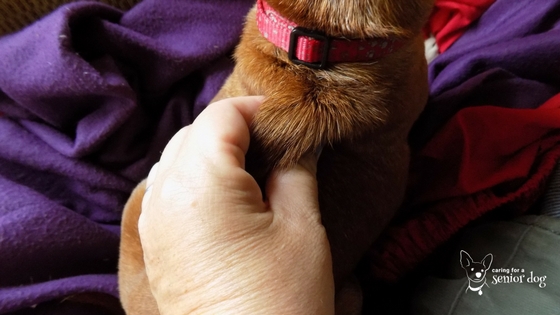
If your senior dog is throwing up, it’s important to determine a cause as quickly as possible. If he’s been eating grass then throws it up later, that’s not uncommon and is often a “one off” occurrence. I wouldn’t worry too much, but I absolutely would keep an eye on him to see how he is.
If, however, your senior dog has already thrown up a few times over the course of even one day, you must call your vet right now. Stop reading and call now! This article will still be here later.
Why the emergency?
It goes without saying, the quicker a condition is treated the better the chances of curing, or at least managing it are. In the case of a senior dog vomiting, it’s particularly critical because it can quickly lead to dehydration which, left untreated, could cause death.
 How can you tell if your dog is dehydrated? The simplest way is to gently pinch a bit of fur from the back of his neck. If it springs back into place right away he’s fine, but if it doesn’t your dog is suffering from dehydration. The longer it takes to spring back, the more dehydrated he is.
How can you tell if your dog is dehydrated? The simplest way is to gently pinch a bit of fur from the back of his neck. If it springs back into place right away he’s fine, but if it doesn’t your dog is suffering from dehydration. The longer it takes to spring back, the more dehydrated he is.
**Even if the fur does go back into place quickly, you still need to call the vet**
Explain your concerns, even offering to sit in the waiting room until you can be seen. If you’re really worried and they won’t help you, find someone who can.
I’m a frequent visitor to my vet, he’s the only one I trust to handle such a complicated case as Red’s, and to be honest I do feel they must make every effort to fit me in. If I’m worried there’s a genuine reason to be worried, so I insist. If he’s there the day I need him, going elsewhere is not an option.
There are many reasons why dogs throw up and they include:
- Eating grass
- Too many treats
- Eating something found on the ground/something toxic
- Car sickness
- Change to a new diet too quickly, or the new food doesn’t agree with your dog
- Swallowed a foreign object
- Side effects of medication
- Heatstroke
- Ulcer
- Addison’s disease
- Pancreatitis
- Inflammatory bowel disease
- Kidney disease
- Liver disease/failure
- Cushing’s
Some of the information your vet will find helpful will be:
- Do you recall your dog eating anything, or sniffing around a certain area?
- How long he has been throwing up?
- How often?
- Is he still eating?
- Is he drinking?
- Is he throwing up his food?
- How often after he eats does he throw up?
- What does the vomit look like?
- Do you notice any other changes such as peeing more – changes in behaviour – listless – restless – whimpering…
What does the vomit look like?
I know this is disgusting, more so for me than you because I’m extremely squeamish about this subject. As a matter of fact I’m feeling sick right now, but it’s important so I’ll write quickly!!
Your vet can tell a lot from what it looks like so try and stomach it (no pun intended), and write down a description of how it looks. Believe me, it can go a long way to helping him diagnose the cause.
Preparing for your appointment
If your vet has an opening and you have to run out the door, go and good luck. However, if you do have some time before your appointment, there are a couple of things you can do to prepare.
Jot down as many answers to the above questions and observations as you can, and bring them with you to your appointment. The more information you provide your vet with, the better.
Bring a urine and poop sample with you just in case. If he needs one or both you’ve saved time, if he doesn’t he can throw them out.
What to expect during your appointment
 The first thing your vet will do is ask what’s been going on, and that’s where the answers to the above questions will come in handy. After that he will examine your dog with a stethoscope, then likely use his hands to feel for any swollen or tender areas. Expect him to take your dog’s temperature as well.
The first thing your vet will do is ask what’s been going on, and that’s where the answers to the above questions will come in handy. After that he will examine your dog with a stethoscope, then likely use his hands to feel for any swollen or tender areas. Expect him to take your dog’s temperature as well.
Treatment
The treatment your vet prescribes will depend on what he finds during his examination. It’s possible he won’t be able to give you a definitive diagnosis until test results come back, but he will almost certainly have his suspicions.
The following are pretty standard treatments –
He may advise you to hold off on food (maybe even water) for 24 hours to settle his stomach, then feed him boiled chicken breast and rice for a few days.
An anti-nausea medication may be given.
If he suspects your dog is in pain, pain meds may also be given.
If your dog is dehydrated, he may recommend keeping him for a few hours of IV fluids. If he is severely dehydrated, 2 or even 3 days of fluids may be needed. When my dog Red needs more than one day of fluids I bring her home at the end of the day, then bring her back first thing the next morning. A catheter is left in her arm with a bandage wrapped around it, because she’s quite squirmy and getting the needle in can be challenging.
If your vet doesn’t feel your dog needs IV fluids, he may recommend adding rehydration support to the water bowl. I always have a few sachets of Royal Canin Rehydration Support on hand if I don’t feel Red is drinking enough. She absolutely loves it and it’s safe to use every day.
How to prevent vomiting
Many causes of vomiting cannot be prevented, but many can be so let’s look at some of the things we do have control over.
If you’re planning on changing your dog’s diet, do so very slowly. Add a very small amount of the new food to the old, gradually increasing it until he is only eating his new food. The transition should take about a week.
Do not feed your dog table scraps. Some human foods are dangerous, and some dogs with gastrointestinal issues for example, will have trouble even with “safe for dogs” food.
If your dog loves to scrounge for food on his walks, keep an extra close eye on him. One second of not looking and Red can easily have something hanging out of her mouth.
If your dog has pancreatitis, please take that very seriously and stick to the prescribed diet. An attack, especially in an old dog with other health issues, can be very serious, and recovery a long, slow process. Sadly some dogs do not recover. Trust me I speak from experience on this one.
Why do dogs throw up – conclusion
While I don’t want you to freak out if your senior dog is throwing up, I do want you to take it seriously, so please call your vet right away and give them as much information as you can. If you’re worried insist on being seen, even if you have to wait.
When I’m worried about Red I make sure my vet fits me in at some point during the day. They know I’m not the type to “cry wolf” so when I need an appointment, they know I’m serious. I always offer to sit and wait, and I think that helps.
What was the reason for your dog vomiting? Was he dehydrated as well? What treatment was prescribed and how is he doing? Sharing helps others so leave your comment below, or on my Facebook page.
Get your FREE report – Tell Tail Signs Your Dog May Have Dementia
I would like to invite you to join Senior Dog Care Club, a new Facebook group for senior dog parents. There you will find lots of helpful tips and advice, a place to ask questions and share experiences. I look forward to welcoming you.

Leave a Reply